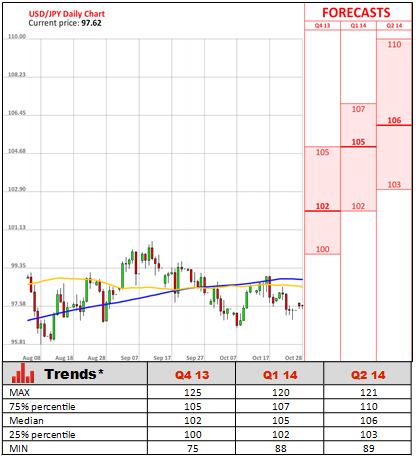It is not a surprise for anyone that the recent 16-day long partial government shutdown and political disputes will have a devastating effect on the world's largest economy; however, mounting polarization of U.S. politics imperils the long term growth. During the shutdown a report from Gallup showed Republican's poll numbers are hitting historic low, as its favourability rating dropped to 28%- the lowest for any party on record. Hence, an economist from the Federal Reserve Bank of Philadelphia, Marina Azzimonti, tried to find a correlation between economic growth and the tone of political debate. The so-called political polarization index is based on news and articles to measure the coverage of lawmakers' disputes from January 1981 and up to April 2013. The measure inched higher during the 2008 recession and peaked closer to 2012. During the last year the measure soared to about 75 in 1981 to almost 200. A more practical implementation of this index is that as a result, it estimates a loss of almost 1.75 million jobs during the last six quarters. Furthermore, investment plunged 8.6%, while output sank 2%. As long as U.S. politicians will not be able to reach a consensus, despite all efforts from the Federal Reserve, the world's largest economy may struggle to build up steam.
Note: This section contains information in English only.
It is not a surprise for anyone that the recent 16-day long partial government shutdown and political disputes will have a devastating effect on the world's largest economy; however, mounting polarization of U.S. politics imperils the long term growth. During the shutdown a report from Gallup showed Republican's poll numbers are hitting historic low, as its favourability rating dropped to 28%- the lowest for any party on record. Hence, an economist from the Federal Reserve Bank of Philadelphia, Marina Azzimonti, tried to find a correlation between economic growth and the tone of political debate. The so-called political polarization index is based on news and articles to measure the coverage of lawmakers' disputes from January 1981 and up to April 2013. The measure inched higher during the 2008 recession and peaked closer to 2012. During the last year the measure soared to about 75 in 1981 to almost 200. A more practical implementation of this index is that as a result, it estimates a loss of almost 1.75 million jobs during the last six quarters. Furthermore, investment plunged 8.6%, while output sank 2%. As long as U.S. politicians will not be able to reach a consensus, despite all efforts from the Federal Reserve, the world's largest economy may struggle to build up steam.

Mon, 28 Oct 2013 07:25:03 GMT
Source: Dukascopy Bank SA
"Polarization significantly discourages investment, output and employment. Moreover, these declines are persistent, which may help explain the slow recovery since the 2007 recession ended."
- Marina Azzimonti of the Federal Reserve Bank of Philadelphia
It is not a surprise for anyone that the recent 16-day long partial government shutdown and political disputes will have a devastating effect on the world's largest economy; however, mounting polarization of U.S. politics imperils the long term growth. During the shutdown a report from Gallup showed Republican's poll numbers are hitting historic low, as its favourability rating dropped to 28%- the lowest for any party on record. Hence, an economist from the Federal Reserve Bank of Philadelphia, Marina Azzimonti, tried to find a correlation between economic growth and the tone of political debate. The so-called political polarization index is based on news and articles to measure the coverage of lawmakers' disputes from January 1981 and up to April 2013. The measure inched higher during the 2008 recession and peaked closer to 2012. During the last year the measure soared to about 75 in 1981 to almost 200. A more practical implementation of this index is that as a result, it estimates a loss of almost 1.75 million jobs during the last six quarters. Furthermore, investment plunged 8.6%, while output sank 2%. As long as U.S. politicians will not be able to reach a consensus, despite all efforts from the Federal Reserve, the world's largest economy may struggle to build up steam.
Meanwhile, U.S. durable goods orders increased 3.7% in September by the most in three months as stronger demand for military and commercial aircraft offset a decline in business equipment.
© Dukascopy Bank SA
Actual Topics
Subscribe to "Fundamental Analysis" feed
Subscribe
Per scoprire di più sulla piattaforma di Dukascopy Bank per Forex/CFD, sul SWFX ed altre informazioni relative al trading,
la preghiamo di contattarci o richiedere di essere contattato (callback request)
la preghiamo di contattarci o richiedere di essere contattato (callback request)
For further information regarding potential cooperation,
please call us or make callback request.
please call us or make callback request.
To learn more about Dukascopy Bank Binary Options
/ Forex trading platform, SWFX and other trading related information,
please call us or make callback request.
please call us or make callback request.
Per scoprire di più sulla piattaforma di Dukascopy Bank per Forex/CFD, sul SWFX ed altre informazioni relative al trading,
la preghiamo di contattarci o richiedere di essere contattato (callback request).
la preghiamo di contattarci o richiedere di essere contattato (callback request).
To learn more about Crypto Trading / CFD / Forex trading platform, SWFX and other trading related information,
please call us or make callback request.
please call us or make callback request.
To learn more about Business Introducer and other trading related information,
please call us or make callback request.
please call us or make callback request.
For further information regarding potential cooperation,
please call us or make callback request.
please call us or make callback request.